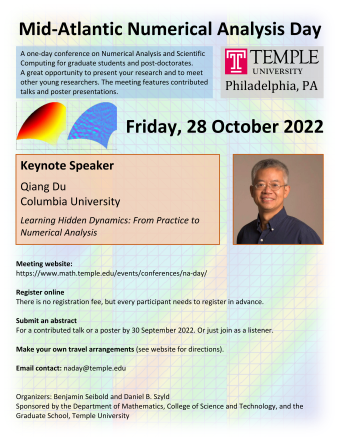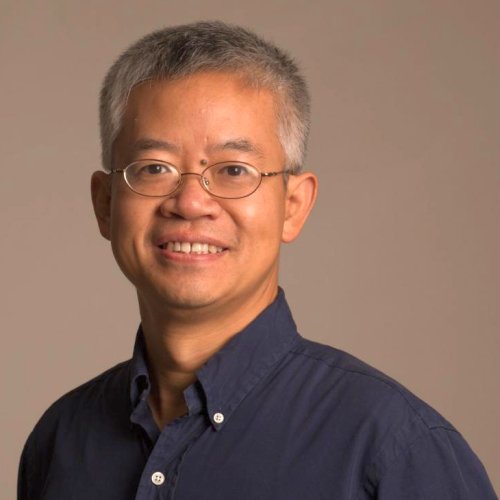A conference on numerical analysis and scientific computing for graduate students and postdocs in the Mid-Atlantic region.
The Conference
This one-day meeting will start at 10am to allow same-day travel. It will be held in Room 617 Wachman Hall, Temple University, 1805 North Broad Street, just north of Montgomery Avenue. It is an opportunity for graduate students and postdocs to present their research, and to meet other researchers. There will be contributed talks and a poster session. There is no registration fee, and no support for travel. Lunch will be provided. We ask every participant to please register in advance, even if they are not planning to give a talk.
Keynote Speaker |
Conference Announcement Poster

Click to download a PDF.
Schedule
| 9:15-9:50 | Registration and breakfast (provided) |
| 9:50-10:00 | Opening remarks |
| 10:00-11:00 | Presentations (Manifolds and Quantum Computing) |
| 11:00-11:15 | Coffee Break |
| 11:15-12:15 | Presentations (Numerical Analysis) |
| 12:15-1:30 | Posters, demos, and lunch (provided) |
| 1:30-2:30 | Keynote lecture (Qiang Du) |
| 2:30-2:45 | Coffee break |
| 2:45-3:45 | Presentations (Modeling and Simulation) |
| 3:45-4:00 | Coffee break |
| 4:00-5:00 | Presentations (Data Methods) |
| 5:00-5:10 | Closing remarks |
| 6:00-8:00 | Group dinner (attendance optional) |
Speakers
| Manifolds and Quantum Computing | ||||
|---|---|---|---|---|
| Samuel Francis | Potter | New York University | Butterfly-accelerated manifold harmonic transforms | |
| Mohammadhossein | Mohammadisiahroudi | Lehigh University | Accurately solving linear systems with quantum oracles | |
| Zeguan | Wu | Lehigh University | Inexact feasible quantum interior point method for linear and quadratic optimization | |
| Numerical Analysis | ||||
| Yukun | Yue | Carnegie Mellon University | On strong convergence of a numerical scheme for Q-tensor flow based on invariant quardratization method | |
| Lucas | Bouck | University of Maryland, College Park | Finite element approximation of a membrane model for liquid crystal polymeric networks | |
| Yangwen | Zhang | Carnegie Mellon University | A new reduced order model of linear parabolic PDEs | |
| Modeling and Simulation | ||||
| Luke | Evans | University of Maryland, College Park | Computing committors via Mahalanobis diffusion maps with enhanced sampling data | |
| Stephanie | Lewkiewicz | Temple University | Computing the reproductive number of the invasive spotted lanternfly with a novel moving mesh method for stage-age-structured PDEs | |
| Mary | Taranchuk | University of Delaware | Do sheets of nematic liquid crystals retain their shape when stretched? | |
| Data Methods | ||||
| Amir | Sagiv | Columbia University | Density estimation in uncertainty propagation - Approximating pushforward measures | |
| Jerome | Troy | University of Delaware | Learning dynamics with adaptive random Fourier features | |
| Mingkai | Yu | University of Maryland, Baltimore County | State and parameter estimation from partial state observations in stochastic reaction networks | |
Posters and Demos
| Rujeko | Chinomona | Temple University | Demonstration of the Neuro-VISOR project | |
| Mariana Graciela | Martinez Aguilar | New York University | A semi-Lagrangian marcher for geometric optics on unstructured meshes in 2D | |
| Andrew James | Higgins | Temple University | Optimal size of the block in block GMRES on GPUs: Computational model and experiments | |
| Kiera Eloise | Kean | Temple University | Energy dissipation rates in 1-equation turbulence models | |
| Céline | Torres | University of Maryland, College Park | On the inf-sup stabillity of Crouzeix-Raviart Stokes elements in 3D | |
| Nour Mengsha | Khoudari Yao | Temple University | Balancing simplicity and accuracy in vehicle energy model |
Accommodation
Make your own arrangements. Please feel free to contact us for information on accommodation.
Contact
Email: naday -at- temple.edu
Organizers
Benjamin Seibold and Daniel B. Szyld
Sponsors
Sponsored and supported by the Department of Mathematics, the College of Science and Technology, the Graduate School, and the Center for Computational Mathematics and Modeling, Temple University.

